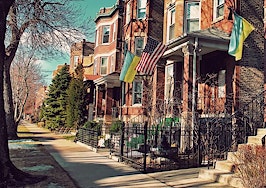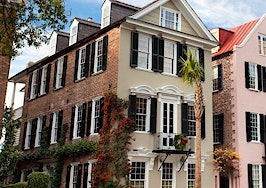- The city of Chicago recently granted a cloud tax exemption to Realtors.
- The tax would have amounted to about $250,000 to city coffers each year.
- Chicago is one of the first cities to propose a tax on cloud computing.
Chicago brokers and Realtors will be exempt from the controversial city cloud tax that took effect Jan 1.
The Chicago Association of Realtors (CAR) got the news in a letter last week from the city.
The tax would have been on the use of data stored in the cloud; something that Realtors do, in quantity, every day. An exemption was made for individuals who are given access to data stored in the cloud as part of membership benefits for a private association.

Jacob Lund / Shutterstock.com
CAR members, as well as others in the state, receive access to Midwest Real Estate Data’s (MRED) MLS and other data as part of membership in their respective associations. That access accounts for about $260 of members’ annual dues, and taxing that portion would have cost each member about $13 a year.
The Chicago cloud tax went into effect Jan. 1, 2016 and applies to cloud software and web hosting. It was of particular concern for Realtors who often upload and maintain listing data online.
CAR shared the news in a statement on Jan. 28.
CAR, other local associations, the Illinois Association of Realtors and MRED were given what’s called a positive Private Letter Ruling from the city of Chicago, which granted the coalition of real estate professionals a cloud tax exemption for Realtor data.
The tax break was given under exemption 11, the de minimus use and transfer of proprietary information exemption. CAR said that its coalition proved the business model used to provide MLS data to Realtors fit within existing exemptions.
The tax proposal first landed on CAR’s radar last summer.
Estimates are that the ruling will head off what would have been an annual cost of more than a quarter million dollars, not including the staff time that would have been required for tracking and billing.
Lack of cloud tax on Chicago Realtors is a win nationwide
This regulatory win also sets a benchmark for other Associations nation-wide who may find themselves in similar situations.
CAR did issue a cautionary note to its 13,500 members as it proclaimed its success.
“While we are pleased with this ruling, we want to advise Realtors that they may be impacted by other industries who utilize cloud services in transactions, including appraisers, attorneys and lenders,” reads a statement. “Realtors should check with their tax professionals to identify areas of exposure.”
“A prime concern for all impacted was once the initial tax rate was established, the likelihood was strong the tax would increase over time,” CAR President Dan Wagner said, in a statement. “Aggressive and thoughtful advocacy has prevented our members from being taxed on data they clearly need.”
Taxing use of “the cloud” is an emerging issue across the nation. While on the one hand, state and local governments responsible for levying taxes on commerce are attempting to adjust to changing technology, users of that technology are feeling the pinch.
Chicago is one of the first cities to propose a tax on cloud computing.
City leaders also have streaming services in their sights. The initial drafts of the tax proposals placed streaming under the amusement tax and the cloud under the personal-property lease tax. Server farms outside the city and software being used by licensing rather than by purchase are already included.
Mayor Emanuel’s team has assimilated other feedback on this issue as well. The proposals were opposed by Chicagoland startups, including those at incubator 1871 and other small businesses who are and will be impacted by this evolving area of the tax code.









